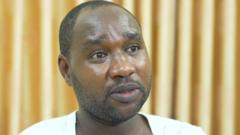Mubarak Bala, a prominent Nigerian atheist, has been released after spending over four years in prison for blasphemy, but his newfound freedom comes with a looming threat to his life. Bala, 40, was convicted in a Kano court after pleading guilty to 18 charges stemming from a controversial Facebook post made in 2020. Following his release, he now resides in a safe house, as his legal team expresses concerns for his safety.
"Freedom is here, but also there is an underlying threat I now have to face," Bala stated in an exclusive interview, reflecting on the challenges ahead despite his relief at being free. In Nigeria's deeply religious landscape, where both Islamic and secular laws co-exist, accusations of blasphemy can lead to serious social repercussions, including discrimination and violence.
Bala, who publicly renounced Islam in 2014, mentioned that during his imprisonment he often feared for his life, particularly in his first prison, located in the predominantly Muslim city of Kano. He noted that his guilty plea, which surprised many, including his legal team, was made to alleviate the pressure on those supportive of him.
His conviction has been met with international condemnation and has ignited discussions on freedom of speech in Nigeria. Many advocates, including Leo Igwe of the Humanist Association of Nigeria, have expressed mixed feelings about Bala's release, acknowledging the relief while also recognizing that it underscores the stigma he still faces.
Imprisoned since the age of 36, Bala now aims to reconnect with his young son, who was only six weeks old when he was incarcerated. Despite the dangers associated with his activism, Bala maintains that he has no regrets about speaking out against religious oppression. His experience sheds light on the broader issues of free expression and the risks faced by those who challenge the dominant religious narratives in Nigeria.






















